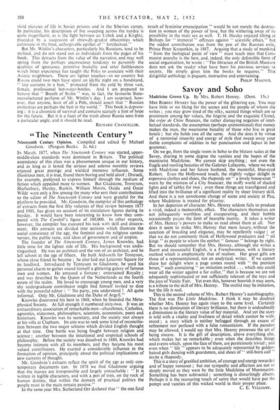"The Nineteenth Century "
Nineteenth Century Opinion. Compiled and edited by Michael Goodwin. (Penguin Books. 2s. 6d.)
IN March, 1877, when The Nineteenth Century was started, upper- middle-class standards were dominant in Britain. The political ascendancy of this class was a phenomenon unique in our history, and as long as it lasted the serious and solemn monthly reviews enjoyed great prestige and wielded immense influence. Some illustrious men, it is true, found them boring and held aloof ; Disraeli, for example, preferred to express himself through the medium of fiction which appealed more to women. But Gladstone, Tennyson, Shaftesbury, Huxley, Ruskin, William Morris, Ouida and Oscar Wilde were only a few among the many who sent their contributions to the editor of The Nineteenth Century and were grateful for the platform he provided. Mr. Goodwin, the compiler of this anthology of extracts from the first fifty volumes of that review between 1877 and 1901, has given no account of its circulation figures during its heyday. It would have been interesting to know how they com- pared with The Cornhill's figure of 100,000. In other respects, however, the compiler has executed his task with skill and discern- ment. His extracts are divided into sections which illustrate the social conscience of the age, the feminist and the religious contro- versies, the public taste, and ideas of government and of empire.
The founder of The Nineteenth Century, James Knowles, had little time for the lighter side of life. His background was undis- tinguished. He was an architect and the son of an architect, and he left school at the age of fifteen. He built Aldworth for Tennyson, whose close friend he became ; he also laid out Leicester Square for its landlord. Introduced by Tennyson to Gladstone, he used his personal charm to gather round himself a glittering galaxy of famous men and women. He amassed a fortune ; entertained Royalty ; and was described by the Queen of the Netherlands as the fourth estate of the realm. He loved to encourage young men, and a very shy undergraduate contributor might find himself invited to dine with the powerful editor : "No party, you understand ! All quite informal. Only Mr. Gladstone and the Duke of Argyll." Knowles discovered his bent in 1868, when he founded the Meta- physical Society. At full strength it numbered sixty-two. It was an extraordinary association of remarkable men—churchmen, Catholics, agnostics, statesmen, philosophers, scientists, economists, poets and historians. Knowles was its secretary, and the society met always at his villa at Clapham. Its aim was to seek some kind of reconcilia- tion between the two major schisms which divided English thought at that time. One battle was being fought between religion and science ; another between the intuitional and empirical schools of philosophy. Before the society was dissolved in 1880, Knowles had become intimate with all its members, and they became his most valued contributors. He exerted a considerable influence in the formation of opinion, principally about the political implications of new currents of thought. Mr. Goodwin's extracts reflect the spirit of the age as only con- temporary documents can. In 1878 we find Gladstone arguing that the masses are irresponsible and largely unteachable : " It is written in legible characters, and with a pen of iron, on the rock of human destiny, that within the domain of practical politics the people must in the main remain passive." In the same year Mrs. Sutherland Orr declared that" the one fatal result of fe minine emancipation " would' be not merely the destruc- tion in women of the power of love, but the withering away of its possibility in the male sex as well. T. H. Huxley enjoyed tilting at Bishops for " immoral " offences against " scientific ethics," but the oddest contribution was from the pen of the Russian exile, Prince Peter Kropotkin, in 1887. Arguing that a study of mankind " from the biological point of view " must teach men that Com- munist anarchy is the best, and, indeed, the only defensible form of social organisation, he wrote : "The librarian of the British Museum does not ask the reader what have been his previous services to society. He simply gives him the books he requires." This delightful anthology is piquant, instructive and entertaining.
PHILIP MAGNUS.


































 Previous page
Previous page